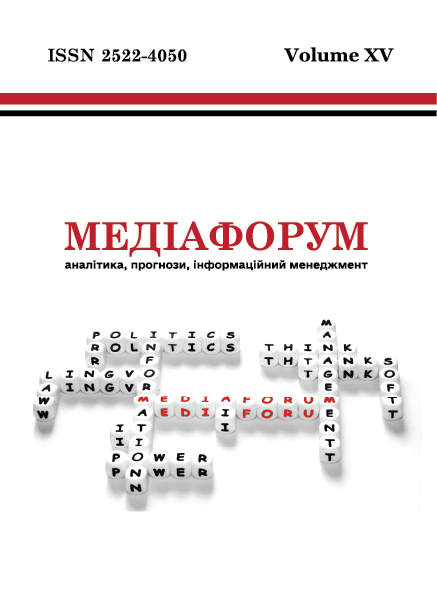Hungary’s Foreign Policy Orientation at the Beginning of the RussianUkrainian War as a Factor in the New Crisis of the Visegrad Group
DOI:
https://doi.org/10.31861/mediaforum.2024.15.109-122Keywords:
Visegrad Group, Hungary, Full-scale Invasion, pro-Russian Policy, Sanctions, Relations Between Ukraine and HungaryAbstract
For the Visegrad Group (VG) countries, the Russian invasion of Ukraine in February 2022 has become a particularly relevant feature of each member’s foreign policy. Today, it has become obvious that the full-scale Russian-Ukrainian war that began on February 24, 2022, will have a significant impact not only on the warring parties, but its consequences will be felt by a number of countries. The VG countries, as elements of the regional subsystem, are forced to respond to security challenges. All VG countries, with the exception of Hungary, understand the risks of further Russian expansion in the event of Ukraine’s defeat and are trying to avoid this, paying special attention not only to helping our state, but also to its own defense. Budapest has chosen a position that differs from the VG partner countries and the EU as a whole. The article analyzes the position of official Budapest after the start of Russia’s full-scale invasion of Ukraine. The focus is on factors that influence the position of Viktor Orban's government (different from other members of the VG), in particular, the issue of support for sanctions against Russia, military and humanitarian aid to Ukraine, the role of the Hungarian ethnic minority in Ukraine, economic cooperation between Hungary and Russia, and the domestic political situation in the country, which directly affects the foreign policy of official Budapest, is considered.
Downloads
References
Vovkanych, I. ta Shnitser, I. (2022) Reaktsiia krain Vyshehradskoi chetvirky na povnomasshtabne voienne vtorhnennia Rosii v Ukrainu. Heopolityka Ukrainy: istoriia i suchasnist, 2(29), s.7-19.
Demchyshak, R. (2022) Rosiisko-ukrainska viina yak faktor heopolitychnoho pozytsionuvannia rehionu TsSIe ta PSIe. Visnyk Lvivskoho universytetu. Seriia: filosofsko-politolohichni studii, 43, s.247-254. Dostupno: https://fps-visnyk.lnu.lviv.ua/archive/43_2022/30.pdf
Diachuk, V. (2022) Spetsoperatsiia «Ukraintsi nam ne druzi»: yak prorosiiski syly orhanizovuiut antyukrainskyi rukh u Yevropi. Infopost, 16 veresnia. Dostupno: https://infopost.media/speczoperacziya-ukrayinczi-nam-ne-druzi-yak-prorosijski-syly-organizovuyut-antyukrayinskyj-ruh-u- yevropi/
Znas, I. (2022) Try chleny «Vyshehradskoi chetvirky» skasuvaly zustrich u Budapeshti. ZN,UA, 29 bereznia. Dostupno: https://zn.ua/ukr/WORLD/tri-chleni-vishehradskoji-chetvirki-skasuvali-zustrich-u-budapeshti.html
Ivasechko, O. ta Lapii, B. (2019) Zahrozy ta vyklyky enerhetychni bezpetsi Vyshehradskoi chetvirky v konteksti realizatsii hazoprovodu «Pivnichnyi Potik-2»: determinanty dlia Ukrainy. Humanitarni vizii, 5(1), s.30-35.
Krainy Vyshehradskoi hrupy domovylysia pidtrymuvaty Ukrainu. Uhorshchyna takozh vydilyt hroshi, 2022. Holos Ameryky, 24 lystopada. Dostupno: https://ukrainian.voanews.com/a/vyshehradski-krajiny-pidtrymaly-dopomohu-ukrajini/6848704.html
Strutynskyi, V. (2021) Vyshehradu 30 rokiv: peredumovy stvorennia, dosiahnennia, mozhlyvi perspektyvy. Istoryko-politychni problemy suchasnoho svitu, 43, s.83-94.
Todorov, I. (2022) Bezpekovyi vymir mizhnarodnykh vidnosyn v Skhidnii ta Tsentralnii Yevropi v konteksti rosiiskoi ahresii. Politychne zhyttia, 1, s.138-144.
Tuzhanskyi, D. (2022) Ne taka vzhe y chetvirka: chomu vidbuvaietsia rozkol Vyshehradskoi hrupy. Infopost, 06 lypnia. Dostupno: https://infopost.media/ne-taka-vzhe-j-chetvirka-chomu-vidbuvayetsya-rozkol-vyshegradskoyi- grupy/
Feduniak, S. (2022) Rosiisko-ukrainska viina yak chynnyk pereformatuvannia postbipoliarnoi mizhnarodnoi systemy. Istoryko-politychni problemy suchasnoho svitu, 46, s.35-41.
BÍRÓ-NAGY A., JUHÁSZ V., SZÁSZI A., VARGA A. (2023) Policy Solutions and Závecz Research: “Foreign policy attitudes 2023”. Available at: https://library.fes.de/pdf-files/bueros/budapest/20492.pdf
BÍRÓ-NAGY A., MOLNÁR K., SZÁSZI A., VARGA A. (2024) Policy Solutions and Závecz Research: “Foreign policy attitudes 2024”. Available at: https://www.policysolutions.hu/userfiles/Policy_Solutions_The_World_ Throug h_Hungarian_Eyes_2024.pdf
Czyż, A. (2017) Państwa Grupy Wyszehradzkiej wobec konfliktu na Ukrainie. In: P. Grzywna, J. Lustig, N. Stępień-Lampa and B. Zasępa, eds. Między ideą, pasją a działaniem. Księga jubileuszowa dedykowana dr. hab. Marianowi Mitrędze. Katowice: Wydawnictwo Uniwersytetu Śląskiego, pp.621-633.
Dijkstra, H. (2022) The War in Ukraine and Studying the EU as a Security Actor. Joint Brief, 15, pp.1-6.
Hasаn, A. (2022) The Russian-Ukrainian war and its implications for international security: a geopolitical vision. Texas Journal of Multidisciplinary Studies, 9, pp.177-192. Available at: https://zienjournals.com /index.php/tjm/article/view/2051
Hungarians perceive Ukraine as greater threat than Russia, study shows. Available at: https://tvpworld.com/79183013/hungarians-perceive-ukraine-as-greater-threat-than-russia
Kotoulas, I. and Pusztai, W. (2022) Geopolitics of the War in Ukraine. Foreign Affairs Institute, 4. Available at: https://www.researchgate.net /publication/361583996_Ioannis_E_Kotoulas_Wolfgang_Pusztai_Geopolitics_of_ the_War_in_Ukraine
Kucharczyk, J. and Mesežnikov, G. eds. (2015) Diverging Voices, Converging Policies: The Visegrad States' Reactions to the Russia-Ukraine Conflict. Warsaw: Heinrich- Böll-Stiftung.
Pressman D. (2023) Hungary stubbornly continues deepen its “connectivity” with Russia. Available at: https://insighthungary.444.hu /2023/06/09/pressman-hungary-stubbornly-continues-deepen-its-connectivity-with-russia
Pressman D. “US envoy slams Orbán as a leader who embraces Putin”. Available at: https://www.politico.eu/article/us-ambassador-slams-hungary-pm-viktor-orban-embracing-russia-over-nato/














